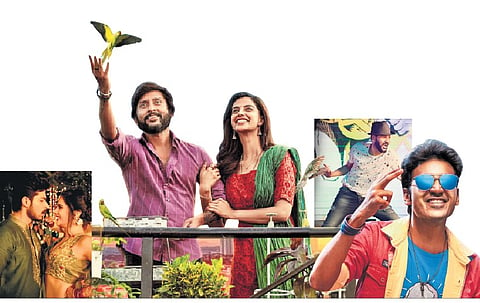

CHENNAI : Interviewing Vivek Siva and Mervin Solomon felt like engaging with one person. The music-composer duo, best known for composing films like Pattas, Dharala Prabhu, and the recently released Singapore Saloon, exude a brotherly camaraderie that makes them complete each other’s sentences. Mervin says, “We have performed in multiple bands in schools and colleges that made us realise what our strengths and weaknesses are. My background is in western music while Vivek hails from the classical side; so we complement and learn from each other.”
The significance of film music has been persistent through the years, with its prominence growing post the pandemic. Vivek observes this trend and states, “At a time when audiences have been selective about choosing films to watch in the theatre, we perceive it as a challenge to exert extra effort in crafting music that truly resonates with them. Initially, when the singles released from a film become a hit, there will be a natural buzz. This helps a lot of smaller films.”
With the launch of their own YouTube channel, the duo try to release at least one or two independent tracks before a film release. Their independent hits like ‘Orasaadha’, ‘Gaandu Kannamma’ and ‘Pakkam Neeyum’ Illai’ have become widely popular. But where on Earth do they get their inspiration from? “That’s why it is important to listen to music from across the globe,” quips Mervin. “We would have heard an African or a Punjabi song. Sometimes we get the energy from listening to superstar Rajinikanth’s speech. Inspiration keeps changing, but we aren’t old enough to create music out of life experiences yet,” he adds humorously.
When the inspiration does hit, they try brainstorming ideas to either make it an instrumental theme or a full-fledged song. “We produce on top of it while adding layers and other instruments. We also call our lyricists so that they can work with us and create the complete structure,” Vivek shares. Since Vivek and Mervin have known each other for 15 years, when one has an idea, the other is already on the same page.
Sometimes, the director’s reference and their end product have been completely opposite. This has worked in their favour to create several chartbusters. Recalling one such instance, Vivek says, “This happened to us with ‘Guleba’ song from Gulaebaghavali for example. The director had confidence in us that we would give our best. The rest is history.” Mervin pitches in, “We got the hook idea to add the part ‘vikkalu vikkalu vikkalu vandha...’ when we were listening to the song itself. I vividly remember that the song shoot was at 6 AM in the morning and we were not satisfied with the lyrics till 15 minutes before the shoot.”
The composers, who love experimenting with genres, explain that blending genres is unique to the Indian film music scene. “In Hollywood, you can do an orchestral score or a hybrid score. Here, you need to know how to do a folk song, ballad, or background score,” they say. With listeners quick to point out if a score sounds similar to a track they have heard before, it is a challenge to avoid unintentional resemblances. Mervin and Vivek give credit to their ‘focus group’ for helping them through the process.
“When you listen to a wide variety of songs, you will know if you have heard it somewhere. Our close set of friends also critique our work and give us instant feedback. Additionally, I make the kids in the area listen to our songs and they would immediately know if it was a tune they heard earlier,” Mervin explains. Amid soaring usage of artificial intelligence in all arenas, the composers admit to have explored using them in their compositions as well. However, he adds a disclaimer.
“AI can only get you so far, like when you want to convert a male voice to a female voice, it will sound robotic,” says Vivek.
Further elaborating on the evolving taste in music among the audience, they say, “More than the taste, their attention span has decreased. Earlier, there used to be two charanams and the duration of the song used to be an average of six minutes. Post 2012, it has come down to three minutes. Now, people discover and consume music on Instagram.” Mervin points out, “We have to run along with the trend. It has come to a point where directors come with the request that the music has to trend on Instagram. Only then, it is considered a popular song.”
The composers, who debuted with their first independent single ‘Orasaadha’ in 2018, which has now touched 100 million views, assert that there is tremendous opportunity in the independent music scene. “Be it Dhee and Arivu’s ‘Enjoy Enjaami’ or Asal Kolaar’s work, the indie space has proved that you need not have big resources to make music. You can just pick up a guitar and ukulele and share music on a streaming platform. It provides a stage for everyone to showcase their creation,” says Vivek.
On the work front, they are currently working on Vijay Antony’s Hitler, Mugen Rao’s Jinn and an unnamed film with Pramod Films.